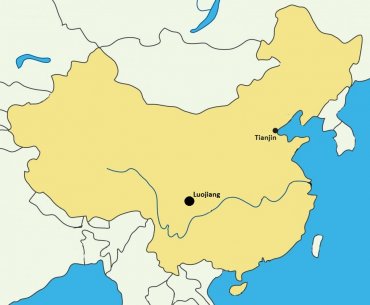Beiersdorf Petroleum and Chemical Corp., a lubricant manufacturer based in Tianjin, northern China, is building a second blending facility on the opposite side of the country, in the Luojiang district of Sichuan province.
With a total investment of about 500 million (U.S. $79 million), the new facility will eventually have two factories with combined capacity to make 300,000 metric tons of lubricants per year, plus a research center. The first factory is slated to start operating in May 2018.

Graphic by Katie Kellenberger
Lubricant manufacturer Beiersdorf Petroleum and Chemical Corp. is building a second blending facility in China in the Luojiang district of Sichuan province.
Southwest China is developing fast, and there are fewer lube suppliers there than other regions in China, Beiersdorf founder Cai Xiaoliang told a reporter during an April 20 interview in his Tianjin office. We want to make sure to be the early birds in the market.
The companys facility in Tianjin currently sells about 20,000 t/y of lubes and, mostly to clients in North China.
The lubricant supplier is not related to Beiersdorf AG, a German marketer of personal care products. In 2013 and 2014, the German company filed complaints with the China Trademark Office and the World Intellectual Property Organization, objecting the Chinese companys use of the name, which the latter registered in China in 2011. The trademark office and WIPO both ruled in favor of the Chinese company.
Supplying the market in Southwest China is not the only reason for Beiersdorf to invest in Luojiang. An important link along Chinas One Belt, One Road initiative, Sichuan province can be a conduit for companies wanting to export to Southeast Asia, Central Asia and Eastern Europe, and for companies that have suppliers in those regions.
In the case of Beiersdorf, it is both.
It usually takes 45 days for us to get base oils from Poland by ship, but with the train running between Europe and Sichuan, it only takes about 15 days, Cai said. The company buys most of its API Group II oils from Formosa Plastics and API Group III oils from Korean companies including SK and GS, but also buys base oils like 150 solvent neutral and bright stock from Poland.
I found Polish-produced base oils are of good quality with really good prices, Cai said, adding he expects to find new base oil suppliers, probably based in the Middle East, under the One Belt, One Road initiative.
The market is moving forward fast. I think in probably three to five years, the demand for Group III base oils by Chinese blenders will be as common as for todays Group II oils, and wed better get ready now rather than later, he said.
In 2016 China gave the nod to domestic private lube companies to sell lubes overseas as a way to ease the pressure of overcapacity.
Cai said Beiersdorf is already doing some export of industrial lubes to Southeast Asia and Africa, but as pre-filled oils in Chinese-made machinery. In the future, though, he plans to sell motor oils with Beiersdorfs own brand outside China.
Beiersdorf plans for its second factory in Luojiang to exclusively serve Chinas military sector. Cai, a former soldier, said it is not uncommon for private companies to get into the seemingly strictly controlled sector.
Private companies like us are not going to supply oils for weapon manufacturing. But you can see us play a small role in the maintenance for weapons and warships, he said.